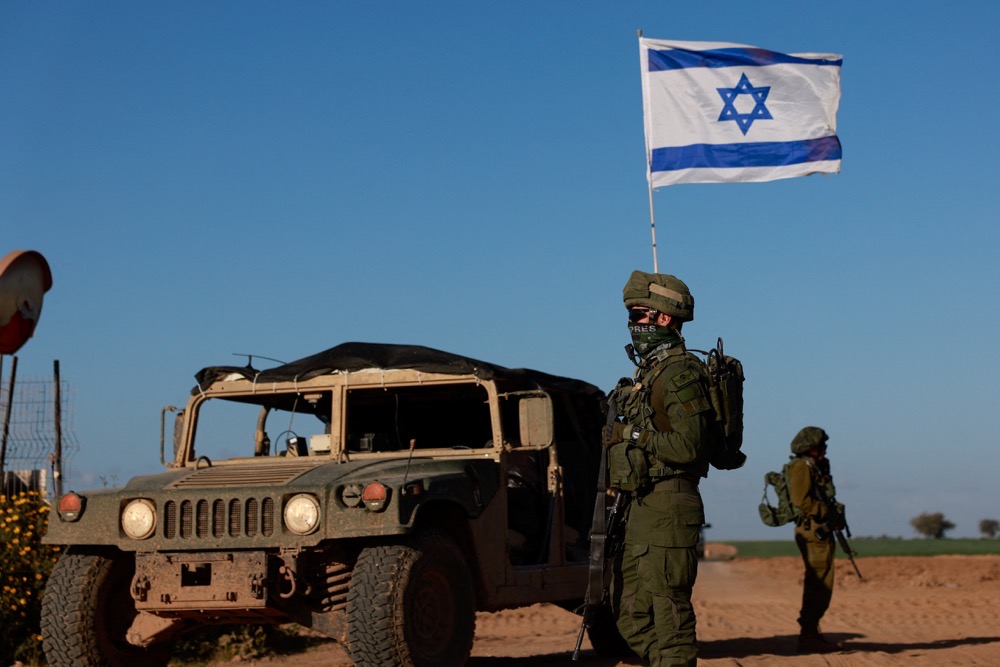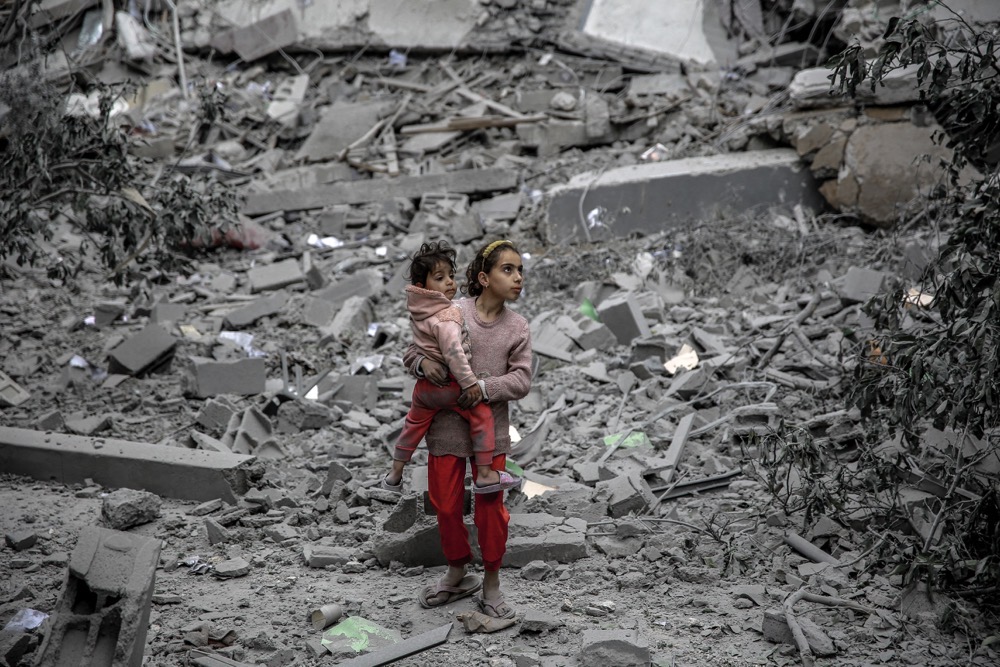GAZA: Looking down to discover her right foot was attached by just a few tattered shreds of skin, 17-year-old Ahed, still in a state of shock, asked the cousin who was carrying her to confirm what she already knew. “Is my leg gone?”
A resident of Gaza City, Ahed is among more than 1,000 children in the Palestinian enclave who have lost one or both of their legs since Israel mounted its retaliation for the Hamas-led attack of Oct. 7, according to the UN Children’s Fund, UNICEF.
On average, at least 10 children in Gaza lose one or both legs every day.

Gaza officials say many of the 30,500 people killed since Oct. 7 are children. (AFP)
“On Dec. 19, I went to the sixth floor (of our building) to call my father, who has been abroad for six years,” Ahed told Arab News. “I wanted to close the curtain in the kitchen because there was an Israeli tank right outside the window.
“I closed the curtain, sat on the chair, and crossed my legs — only to find myself, within a fraction of a second, face down on the floor, unable to move a muscle.
“The tank hit me.”
Freed from the rubble by her mother and sister, Ahed was carried by a cousin to her uncle, a doctor who lives in the same building. “They placed me on the dining table, where my mom was preparing dough (for bread),” she said.
Short of medical equipment, Ahed’s uncle cleaned the wound as best he could with soap and a sponge used for washing dishes, sutured the arteries with thread to stop the bleeding, and performed the amputation with a kitchen knife.
“There was no numbing agent,” said Ahed. “My anesthetic was the Qur’an. I kept reciting the Quran.”

Young people who are exposed to explosive violence are more likely to sustain life-changing injuries than adults. (AFP)
Many of the operations performed on children in Gaza since the conflict began have taken place without anesthetic, according to the World Health Organization, as the healthcare system in the Palestinian enclave has been left crippled by the fighting.
To keep the wound as clean as possible, Ahed’s family had to boil and reuse her gauze. This continued for four days, as the Israeli siege on the family’s neighborhood prevented her from reaching Gaza’s main hospital, Al-Shifa, which was a mere five-minute drive away.
When she was finally admitted to the small Patients’ Friends Association hospital, approximately 1 km from Al-Shifa, Ahed had to endure further surgeries — again without anesthesia or pain relief.
“I underwent surgery because nothing my uncle used was sterilized, and there was also a serious fracture in my left leg,” she said.

The Israeli in the Gaza Strip as killed 30,000 Palestinians since Oct. 7, 2023. (Reuters)
Many Palestinians have lost limbs that could have been saved under normal circumstances. But owing to a shortage of medical staff, supplies, and fuel to keep hospital generators running, many patients are not seen in time.
According to the WHO, just 30 percent of Gaza’s medics are still working and 13 out of the enclave’s 36 hospitals remain partially functional. In the south, nine hospitals are operating at three times their intended capacity amid critical shortages of basic supplies and fuel.
“The lack of access to medical resources and the siege of the Gaza Strip have caused shortages of medicine and equipment, leading health facilities to resort to amputations to prevent further infections,” Lise Salavert, humanitarian advocacy manager at Handicap International, told Arab News.
“Children are suffering from intense pain and are prone to more infections due to poor hygiene in shelters. The cold weather and heavy rains in Gaza also expose children with amputations to additional health risks.
INNUMBERS
10 — Children per day, on average, who lost one or both legs since Oct. 7 (Save the Children).
1,000 — Children who have had one or both legs amputated since Oct. 7 (UNICEF).
13 — Hospitals that remain partially functional out of Gaza’s 36 facilities (WHO).
30% — Proportion of Gaza’s pre-conflict medics who are still working (WHO).
“These children require prostheses for mobility and independence, but the shortage of supplies makes it difficult for them to receive personalized prostheses and necessary training. These children will need continuous support until their growth is complete and a regular change or adjustment of their prosthesis.”
According to the humanitarian aid agency Save the Children, young people who are exposed to explosive violence are more likely to sustain life-changing injuries than adults.
“They have weaker necks and torsos, so less force is needed to cause a brain injury,” Jason Lee, Save the Children’s country director for the occupied Palestinian territories, said in a report published earlier this year.
“Their skulls are still not fully formed, and their undeveloped muscles offer less protection, so a blast is more likely to tear apart organs in their abdomen, even when there’s no visible damage.”

opportunities to heal and rehabilitate unavailable to the children of Gaza are being provided by aid agencies abroad. (AFP)
He added: “The killing and maiming of children is condemned as a grave violation against children, and perpetrators must be held to account.”
Of course, not all wounds are visible. The psychological scars inflicted on children caught up in conflict zones cause lasting damage. Yet professional support for these young people is unlikely to be made available, even once the conflict is over.
Salavert of Handicap International warned that “untreated trauma can lead to enduring mental and physical disabilities” and that “the prevalence of mental and physical disabilities in the Gaza Strip is expected to increase significantly as the conflict continues.
“The conflict has also significantly reduced the capacity of existing diagnosis and rehabilitation centers in Gaza due to extensive damage and destruction of civilian infrastructure.”
Elaborating on the mental health toll of the conflict, Salavert added: “Sustaining a life-altering injury at a young age, such as undergoing an amputation while wide awake, can have profound and long-lasting mental health impacts on children. These experiences can lead to feelings of shock, fear, and helplessness, causing immediate trauma.

Sustaining a life-altering injury at a young age can have profound and long-lasting mental health impacts on children, Lise Salavert told Arab News. (AFP)
“Children may experience intense pain and distress during the procedure, which can lead to post-traumatic stress disorder, anxiety, and depression. The loss of a limb can also result in feelings of grief, loss, and lack of sense of identity.
“Furthermore, children may face challenges in adjusting to their new physical capabilities, which can impact their self-esteem and body image. They may also struggle with feelings of isolation and stigma.”
Ahed’s terror was made worse by the fighting that was ongoing around her. While she was recuperating at the Patients’ Friends Association hospital, Israeli forces attacked the district.
Opinion
This section contains relevant reference points, placed in (Opinion field)
“I was scared of reliving the same experience,” she said. “Every time I heard the sound of a tank, I told my mother to turn me to the right side, which has sustained significant damage, to protect my left side (in case the Israeli forces) bomb us.”
Jeeda Al-Hakim, a specialist counseling psychologist with City University of London, said that after losing an arm or leg, a child experiences “grief and mourning over the loss of their limb.”
She told Arab News: “The initial stages might include confusion, as they may not always understand or fully appreciate the loss of their physical abilities. They might struggle with engaging with some of their previous activities,” which, in response, can cause a range of distressing emotions.
“They may also grieve for the life that they had before the injury.”

Israel is conducting a devastating air and ground campaign in the Gaza Strip. (AFP)
After losing a limb, Al-Hakim said children also experience “emotional withdrawal because they are trying to cope with the violence — they can start to withdraw or not show any emotions towards what is happening, or towards other family members.
“We can see this in some of the imagery when we are looking at what is happening in Gaza.”
She also highlighted that a child might experience “psychosomatic symptoms,” which are “physical symptoms, such as headaches, stomach aches, chest pains, difficulty breathing, and speech impediments, that usually have no biological markers.”
Emphasizing the importance of having a support network for coping and recovery, Al-Hakim said the loss of family members and care providers further compounds the predicament of Gaza’s children who have sustained life-changing injuries.
UNICEF estimates at least 17,000 children in the Gaza Strip are unaccompanied or separated from their parents.
Moreover, the lack of access to medication “increases the risk of exclusion from communal safe spaces, like shelters, due to stigma or fear of unpredictable behaviors,” said Handicap International’s Salavert.
The lack of basics such as food, water, shelter and sanitation also means it is impossible for Gaza’s children to recover both mentally and physically.
Calling for “a long-lasting ceasefire with massive delivery of humanitarian assistance” into Gaza, Salavert said: “As long as those basic humanitarian needs are not covered and children do not have a feeling of safety, working on mental health issues will be challenging and nearly impossible.”

The lack of basics such as food, water, shelter and sanitation also means it is impossible for Gaza’s children to recover both mentally and physically. (AFP)
She warned that “the impact of these injuries on their future prospects, including education, employment, and overall quality of life, cannot be understated.
“It is crucial for post-war reconstruction efforts to prioritize the needs of these children. Humanitarian aid and support will be essential in addressing these challenges and providing a hopeful future for these children.”
In the meantime, opportunities to heal and rehabilitate unavailable to the children of Gaza are being provided by aid agencies abroad.
With the help of the Palestine Children’s Relief Fund, a humanitarian organization providing medical relief to children in Palestine, Ahed is today receiving treatment in the US at Shriners Hospitals for Children.





























